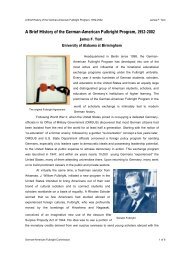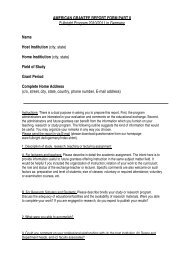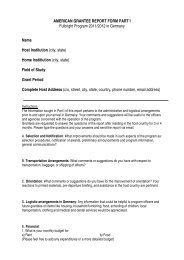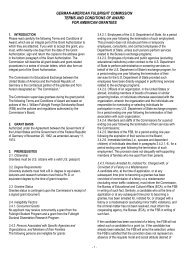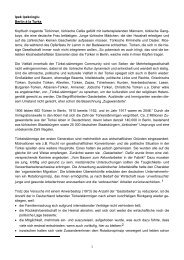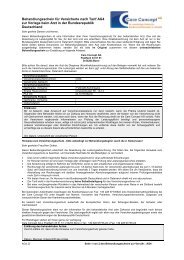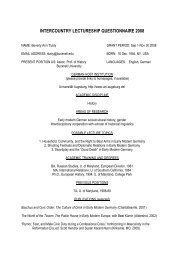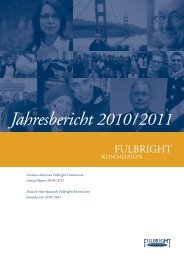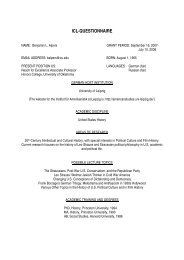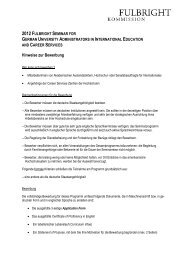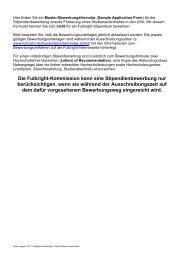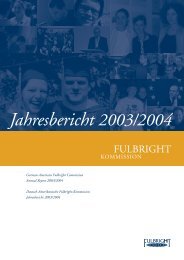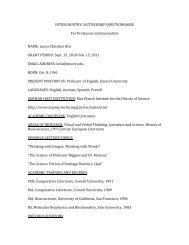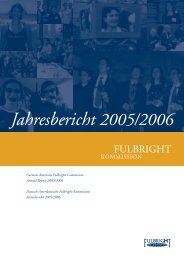The First Class of Fulbrighters - Fulbright-Kommission
The First Class of Fulbrighters - Fulbright-Kommission
The First Class of Fulbrighters - Fulbright-Kommission
You also want an ePaper? Increase the reach of your titles
YUMPU automatically turns print PDFs into web optimized ePapers that Google loves.
AT VIRTUALLY THE SAME<br />
TIME, a freshman senator from<br />
Arkansas, J. William <strong>Fulbright</strong>, initiated<br />
a new program in the United States<br />
intended to bring Americans out <strong>of</strong> their<br />
own brand <strong>of</strong> cultural isolation and to<br />
connect students and scholars worldwide<br />
on a basis <strong>of</strong> equality. A Rhodes Scholar<br />
worried that so few Americans had studied<br />
abroad or experienced foreign cultures,<br />
<strong>Fulbright</strong>, who was pr<strong>of</strong>oundly<br />
moved by the bombings <strong>of</strong> Hiroshima<br />
and Nagasaki, conceived <strong>of</strong> an imaginative<br />
new use <strong>of</strong> the obscure War Surplus<br />
Property Act <strong>of</strong> 1944. His idea was to<br />
use a portion <strong>of</strong> the monetary credits<br />
derived from war surplus overseas to send<br />
young scholars abroad with the twin<br />
goals <strong>of</strong> advancing knowledge and furthering<br />
mutual understanding. A convincing<br />
advocate and skilled political<br />
strategist, <strong>Fulbright</strong> won over the initially<br />
hesitant Congress, Treasury, and State<br />
Department, and on August 1, 1946<br />
President Truman signed <strong>of</strong>f on the P.L.<br />
584 Amendment. Using State Department<br />
infrastructure for support, the program set up an<br />
independent Board <strong>of</strong> Foreign Scholarships (renamed the J.<br />
William <strong>Fulbright</strong> Foreign Scholarship Board in 1991) so<br />
that participating nations could select qualified scholars and<br />
educators to visit the U.S. while the BFS would choose<br />
young scholars to send abroad.<br />
KNOWN AS THE FULBRIGHT ACT, the program<br />
was destined in Germany’s case to overtake the<br />
exchange program in the American Zone, elevating the<br />
underlying purpose <strong>of</strong> the exchange from postwar re-orientation<br />
to genuine partnership. <strong>The</strong> <strong>Fulbright</strong> Exchange Program<br />
began operation in 1948, first targeting former Allied<br />
nations that were recovering most rapidly from the war.<br />
<strong>The</strong> possibility <strong>of</strong> creating a German <strong>Fulbright</strong> Program<br />
was first addressed in 1949 after the establishment <strong>of</strong> the<br />
Federal Republic <strong>of</strong> Germany. Chancellor Konrad Adenauer<br />
and U.S. High Commissioner John J. McCloy entered into<br />
lengthy negotiations, but because the Federal Republic had<br />
Senator J. William <strong>Fulbright</strong><br />
2 3<br />
not yet attained full sovereignty and because <strong>of</strong> funding<br />
intricacies and legal issues delays ensued. <strong>The</strong> United States<br />
signed the (<strong>Fulbright</strong>) Executive Agreement with the Federal<br />
Republic on July 18, 1952, and the binational <strong>Fulbright</strong><br />
Commission came into existence.<br />
Beginning with the academic year 1953-54, approximately<br />
200 American graduate students, twenty teachers,<br />
and a handful <strong>of</strong> senior scholars arrived in Germany, while a<br />
comparable group <strong>of</strong> German students, teachers, and senior<br />
scholars traveled to the United States. From its inception,<br />
the program was a great success, as evidenced by the summary<br />
reports submitted by participants at the conclusion <strong>of</strong><br />
their year-long programs.. On both sides, the participants<br />
found their Weltanschauung and their understanding <strong>of</strong> people<br />
(as distinct from nations) immeasurably widened, just as<br />
Senator <strong>Fulbright</strong> had so fervently wished.<br />
- James Tent is a pr<strong>of</strong>essor for German history at the University <strong>of</strong> Alabama<br />
at Birmingham.



